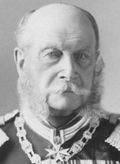Born of the marriage of the future Prussian king Friedrich Wilhelm III and Luise von Mecklenburg-Strelitz, young Wilhelm participated in the Liberation War against Napoléon I and chose a military career, which also required his participation in diplomatic missions. After the 43-year reign of his father (1797-1840), Wilhelm's elder brother, Friedrich Wilhelm IV, inherited the Prussian lands in 1840 and Wilhelm became the Prince of Prussia and heir presumptive. When Friedrich Wilhelm IV was incapacitated as a result of a stroke, Wilhelm assumed the government (23 Oct 1857) and later was made regent (7 Oct 1858 - 2 Jan 1861). Upon the death of Friedrich Wilhelm IV (2 Jan 1861), Wilhelm was proclaimed king of Prussia and ruler of royal lands united under the scepter of Hohenzollern dynasty. He crowned himself on 18 Oct 1861 in Königsberg. In 1862, Wilhelm appointed Otto von Bismarck prime minister and favored conservative politics implemented by the government. Prussian dominance in Germany was reassured by the victory in the Seven Weeks' War against Austria (1866), which led to the creation of the North German Confederation (Norddeutscher Bund). As Prussian king, Wilhelm was entitled to the Presidency of the Confederation (1 Jul 1867) dominated by Prussia. The unification of Germany was incomplete without entry of the southern states into the North German Confederation and Bismarck used the Franco-German War (1870-1871) to consolidate the nation and to overcome the reluctance of rulers of the southern states. After decisive victory at Sedan (2 Sep 1870), nothing prevented Bismarck from establishing a new empire. The unification agreements, which created the German Reich, were ratified by the parliaments of the North German Confederation, Baden, Hessen and Württemberg in December 1870, effective from 1 Jan 1871, and by Bavaria retroactively to that date. According to the agreements, Wilhelm became the German Emperor. He agreed to accept the title in an address to the North German Reichstag (18 Dec 1870) and in a letter to the spokesman of the princes and free cities (14 Jan 1871). The assumption was solemnly proclaimed on 18 Jan 1871 in the Hall of Mirrors of the Versailles Palace in front of German ruling princes, nobility, and military commanders. The last part of Wilhelm's reign was marked by campaigns against political Catholicism (Kulturkampf), socialists and anarchists, initiated by Bismarck, who held the office of Reich Chancellor (21 Mar 1871 - 20 Mar 1890). Wilhelm survived two attempts on his life made in 1878 and was incapacitated from 4 Jun 1878 to 5 Dec 1878. His son, Crown Prince Friedrich Wilhelm, exercised the functions of his father in this period. Biography source: Herre, Franz. Kaiser Wilhelm I: Der letzte Preuße. Cologne: Kiepenheuer & Witsch, 1980; Börner, Karl-Heinz. Wilhelm I: Deutscher Kaiser und König von Preußen. Eine Biographie. Berlin: Akademie, 1984. |

